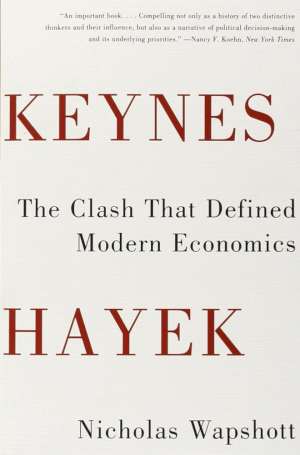30 June 2012
Keynes Hayek
The Clash That Defined Modern Economics
Nicholas Wapshott
2011, Norton, 380 pages, £18.99
ISBN 9780393343632
Reviewer: Diane Coyle, Enlightenment Economics

Is it a sign of the times that the Keynes versus Hayek clash of the 1930s has become one of the hottest topics in modern macroeconomic debate? Along with the terrific rap videos by EconStories http://econstories.tv , and the Keynes-Hayek debate held at the LSE http://www.bbc.co.uk/programmes/b012wxyg , there is this widely-publicised book by business journalist Nicholas Wapshott. It’s an enjoyable and clear read, and although the author appears to lean towards Keynes in his sympathies, it is very fair to the thinking of both great economists. In fact, Keynes emerges as a bit of a snob and intellectually arrogant, a perspective one doesn’t often get from the hero-worshippers who tend to write about him.
One of the contributions of this book is to set the thinking of the two men in the context of its times. It shows both of them responding to the combination of the turbulence of the 1920s and 30s, and their own specific experience of it - hyperinflation in Austria, and the iniquities resulting from reparations, in Hayek’s case; mass unemployment and the damage done by the Gold Standard in Keynes’s case.
Hayek’s philosophy was set quite early in his career by his connection with Ludwig Von Mises, whose work presaged Hayek’s argument that central planning obscured the information market prices carried about individuals’ opinion of the worth of a product or service, and thereby deprived people of an important freedom. Keynes, in a 1924 lecture, ‘The End of Laissez Faire’, was already arguing: “The world is not so governed from above that private and social interest always coincide. It is not so managed here below that in practice they coincide. It is not a correct deduction from the Principles of Economics that enlightened self interest always operates in the public interest.”
Of course, the economy went on to prove him right in this, and the Second World War by necessity took the government deeply into the management of the economy. After the war, the imperative of building a welfare state for returning service men and women kept it there. The book also explains how the evolution of the academic economics profession in the US - in particular the brilliant exposition of the Keynesian world view by Paul Samuelson - meant that before long we were ‘all Keynesians now’ (as Milton Friedman put it). Wapshott also sets out the inter-relationship between US budget policy and the need for defence spending. (I was struck by the success of big Keynes-inspired tax cuts in stimulating growth, and subsequent tax revenues, in 1964, a sharp contrast to the effect of the Reagan tax cuts, which are now usually derided as Laffer-curve mumbo jumbo.)
Which takes us to the modern-day obsessive interest with Keynes vs Hayek. Their intellectual or philosophical disagreement is often taken to correspond to a difference of opinion about whether the government can and should offset an economic downturn by increased deficit finance. By the end of this book, I concluded that they might agree or disagree about that right now - it’s hard to say, given that they would both have drawn conclusions depending on the specific conjuncture; but the real difference would lie in their views about the scope to engineer any economic outcome. Hayek believed, to quote Wapshott: “The uncomfortable truth is that only time will cure an economy in disbalance…. Only the long haul will provide a true recovery.” Hayek argued that monetary policy had its limits, as well as fiscal policy.
The other key difference between them was Keynes’s skill as a communicator, in contrast to Hayek’s uptight personality and heavily accented English. If not for this distinction, we might all be Hayekians now. For surely one of the ‘uncomfortable truths’ macroeconomists need to confront post-crisis is that Hayek was right about the limits of activist macro policy, and if he had been the great communicator, rather than Keynes, we would perhaps bracket him now with economists like Hyman Minsky who see an intrinsic credit-driven cycle in the behaviour of the economy overall. Hayek-inspired evolutionary models of the macroeconomy are increasingly contesting the Keynes-inspired engineering models of the economy that have held sway since the 1940s. The Keynes vs Hayek debate will continue to resonate. This book is a good place to start thinking about it.
